|

|
Hot Toys True Type 1 male body
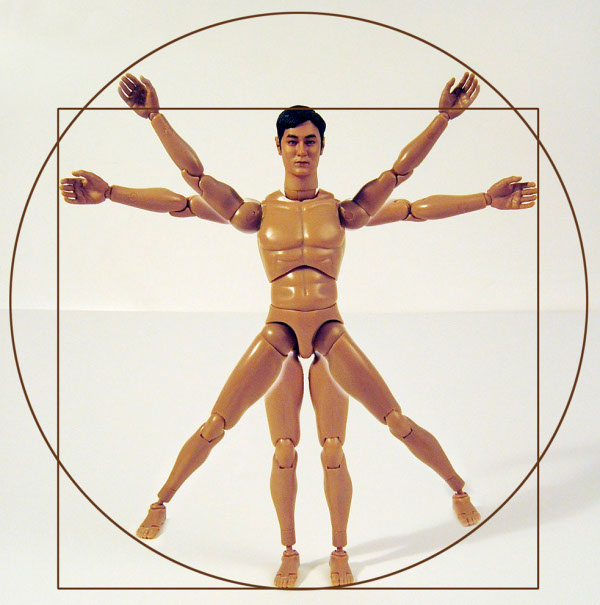
"The
following is a guest review. The review
and photos do not necessarily reflect the opinions of Michael Crawford
or Michael's Review of the Week, and are the opinion and work of the
guest author."
|

Jeff Parker takes a look at the
TrueType body from Hot Toys, one of the nicest (if not the best) sixth
scale bodies on the market today. Show us all the nekkid
goodness, Jeff!
This isn’t a review, more a description of the Hot Toys (HT) base body
known as the True-Type (TT). I’ve been reviewing a lot of the 1/6
figures from them recently, so the ‘articulation’ category can get
pretty repetitive and in doing this it will act as a description I can
link to whenever the TT is used.
You can find reference of these bodies on the HT website:
Asian
relaunch
Caucasian
relaunch
I’d like to point out that in none of the photo’s (apart from the
DaVinci’esque styled Vitruvian man) has any photo shop been used to
mask stands or tape. All the poses were achieved using the figures
centre of gravity.
|
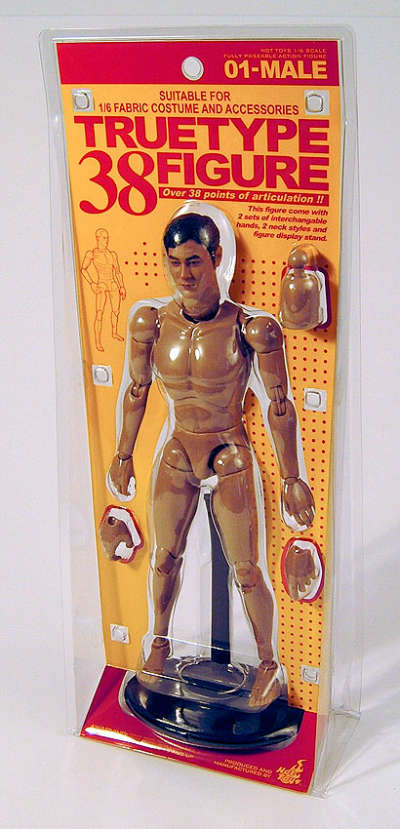 |
|
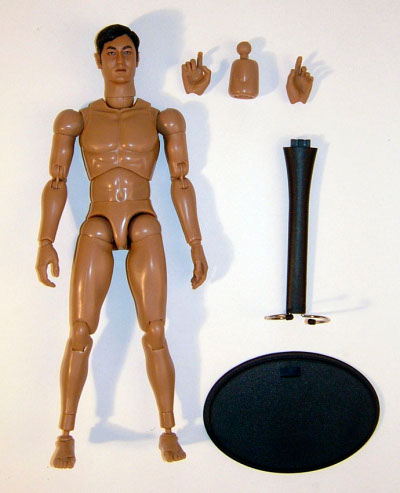
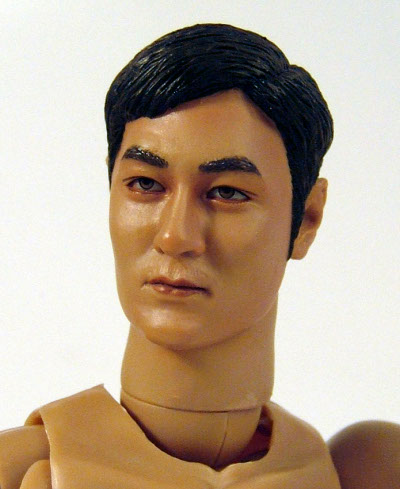
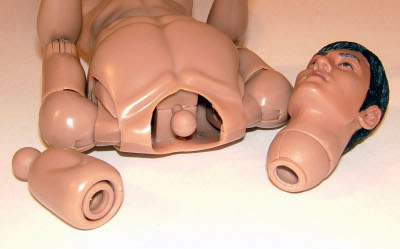
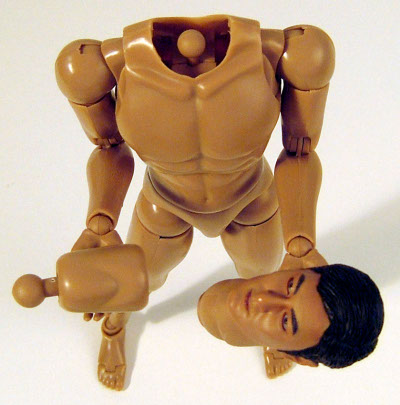
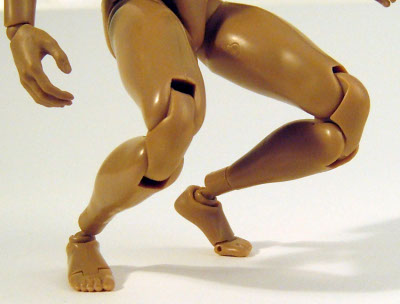
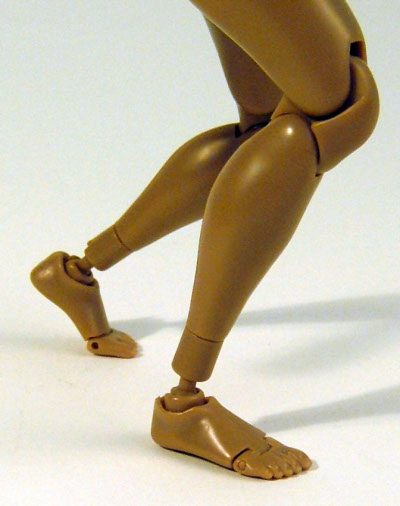
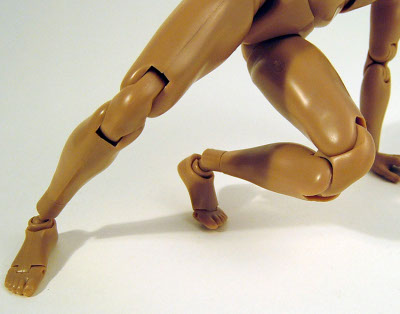
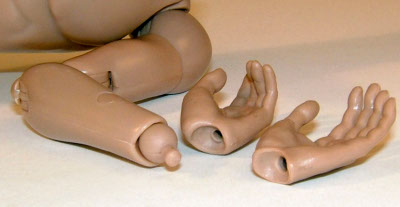
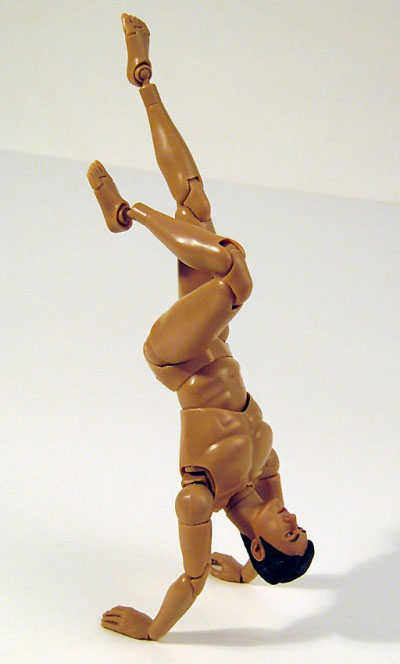
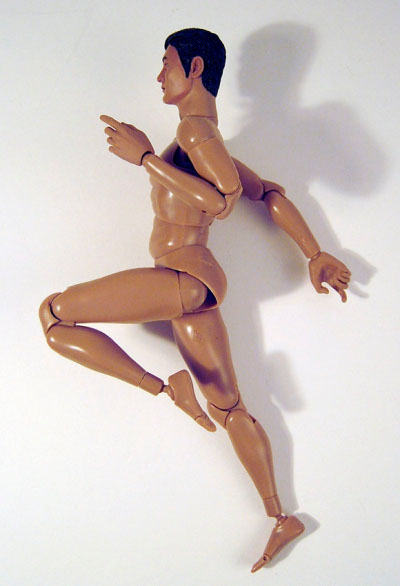
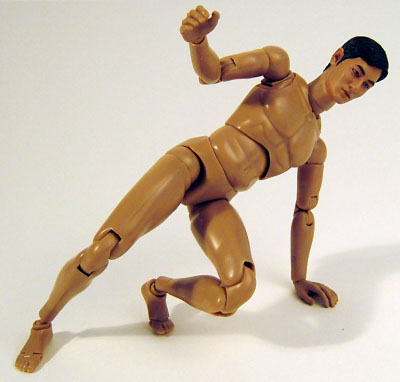
|
So starting
from the feet up, we have a hinged joint so the toes/forefoot can bend
for crouching positions. The ankles are a double-ended ball joint
offering a great range of positioning, meaning the foot can be placed
flat on the ground even when the hips or knees are angled away from the
body, they also mean the feet can face in any direction. Just above the
ankle is a cut joint. This is glued in place, but can be removed should
you want to shorten the figure. It’s more a job for a confident
‘customiser’ rather than a casual ‘alteration’. Unless you really know
what you are doing, I’d always recommend that if something doesn’t seem
to ‘want’ to move, don’t force it.
Next up are the double knees, pretty standard these days, but they
enable the knees to completely double back on themselves for a
convincing kneeling position. The hips have a ball joint attachment at
the top of the leg and at the pelvis, so pretty much any position a
non-contortionist can assume is achievable with this figure. The only
real restriction is when trying to push the leg backwards, as the
engineering at the top of the leg comes up against the bottom ridge of
the buttock. However this means that when dressed the clothing will
look much more natural from behind, but some movement is lost.
The waist and mid-abdomen have a ball-jointed mechanism, there’s not a
huge amount of movement here, but certainly enough to mean a slight
curvature can be given to the trunk either side to side, forwards or
backwards.
The shoulder is just about the most complicated joint on the whole
figure. Housed within a cavity in the shoulder area is a post that can
spin forwards or backwards and it can also rock up and down attached to
this is a peg going into a ball. This ball is then attached by means of
another free moving peg to the top of the upper arm. I hope this
description gives you some idea, but what you end up with is a
universal joint that needs you to sit and study it for a few minutes.
Once you have familiarised yourself with its full range, you’ll be
amazed at what positions you can get it into.
Next down the arm is the double-elbow, this operates like the double
knee meaning the arms can fold directly back on themselves a full 180
degrees. The wrists are a cut-ball, with a peg at either end of the
radius, one pushes into the lower arm and the other fits straight into
the hand. The base body comes with four hands, two pistol grip and two
relaxed, these are easily exchangeable, but should you ever have any
problems, either a dunk in boiling water or a few seconds warming from
a hair-dryer will normally make them slip on and off a lot easier.
Last up is the neck post. Hot Toys use three designs of post. One is
for attaching to a head with a sculpted neck, this simply attaches at
the base of the neck and then in turn attaches to the body by a counter
sunk ‘pop-in’ ball joint. This design works well on figures that
require sculpting or paint apps, that can’t just stop at the chin, the
other kind of post (both of which are supplied with the base figure)
has a ball joint at both top and bottom. This obviously requires a
different type of head design, with no neck included so the top ball
joint just pops into a countersunk hole and cup in the underside of the
head. This allows for a greater degree of mobility so the head can look
up and down more acutely, it also means that when tilting the head from
side to side you can achieve a little more ‘character’ in your poses.
It’s also worth noting again, that if you ever experience any
difficulty getting the heads on or off, a little heat application can
go a long way.
A few recent releases like Will Turner, James Dean and Won Ka Kui have
used a different neck post that is sculpted into the chest, this is to
achieve a better aesthetic with characters with open shirts and visible
necklines (the standard base TT isn’t like this).
Some figures also come with moulded boots that the ankle pegs fit
directly into, and others have hand and glove sculpts that require a
cuff or gauntlet to cover the wrist joint. These are obviously to keep
the final look as accurate as possible to the source material and keep
the aesthetic pleasing, but in these cases some of the mobility in
these joints will be lost.
There, I think that covers everything. At present the TT is my
favourite base body, there are aspects of the Medicom RAH 301 that I
really like, there’s no denying that it is also a wonderful piece of
engineering, but its fragility has started to worry me more and more
having had two break at the hip without any real pressure being
applied, and to some it’s slightly smaller scale seems an issue. I’m
hoping the new SST Prometheus will stand up well (pun intended) against
the TT, but only time will tell.
Where
to Buy -
You can also use the
sponsor MyAuctionLinks
to search ebay.
KEEP SCROLLING DOWN FOR LOTS
MORE PHOTOS!
|
|
|
|
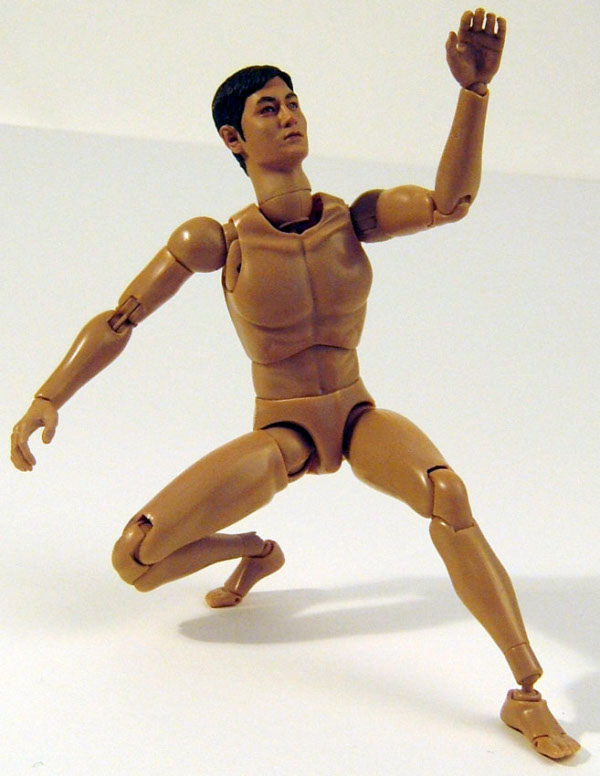
|

Figure from the collection of Jeff Parker.
|

